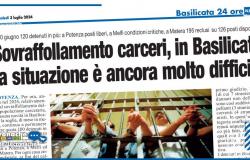The recent debate on the role of the University in the city has relaunched the need to understand which functions and vocations the city of Latina should focus on to finally start a path of economic growth. We talk about it with Marcello Ciccarelli, a historical militant of the left, former mathematics teacher, lately also a writer and always a harbinger of lucid and reasoned critical analyses that offer food for debate.
Ciccarelli, let’s start from Latina. How do you see your city?
We are in a bad period for the city and its territory. Not only do we not find the key to a hypothesis of economic development, but now we also have image problems. We had just managed to make people forget the Maietta and company affair that now we have to pay for the cases of exploitation of Karibu and the laborers with the brutal epilogue of Satnam Singh. There is no point in beating around the bush: we are perceived as the land of exploitation of workers, very far from the city of welcome that we would like to boast.
How do you think this perception can be changed?
A good cultural policy would help at least to rebuild an image of the city. However, a great unity of purpose and contributions would be necessary. Instead, I note a process of verticalization in decisions. We proceed in fits and starts, without discussion, not using the best energies. I am referring to initiatives taken and to be taken, such as the proposal of Latina as capital of culture, the 30-year destination of Ruspi and the Bank of Italy and the Centenary Law. Perhaps this can be useful now that the opposition amendments have shifted the focus from the Foundation and the fascist period to the broader twentieth century.
She mentioned to Ruspi and former Bank of Italy that the Municipality is preparing to entrust to La Sapienza, and I understand that she didn’t like this choice.
I think this agreement with Sapienza is wrong because it is the product of an outdated idea of University. We continue to imagine it as a tool to enliven the historic center. Just as we imagine the connection with the territory. What does “Faculty linked to the territory” mean? It is a reductive formula, valid for a professional technical institute not for a modern University. By now this is characterized by the specializations of its faculties and by the transfer of their scientific know-how to the territory. Let’s take a step back. Our university center was conceived, in the nineties, to solve the overcrowding of Sapienza. Now the time has come for its complete qualification. First of all, master’s degrees for each course, then more doctorates, more research grants. Finally, for the projection on the territory in order to innovate the production processes we must think of agreements and laws with the Region, the Chamber of Commerce, local companies. We need business incubators, funds for start-ups, support for companies of young researchers, business consultancy companies…
And don’t you think that in this vision it is important to entrust new spaces to the university?
Certainly. But not in the way the administration is proceeding. Ruspi and Banca’s choices envisage a widespread university with students and teachers who commute, like lost souls, from one location to another in the city. An idea of a peripatetic university city. The university in the historic center is an urban planning idea conceived in the 20th century to repopulate the urban centers of medieval cities, such as Camerino, Perugia…. Our center has more than 4000 students, almost all from the city and its hinterland. Here you are. Let’s start with their current needs! We should think about forming a university complex with complete services. A citadel that needs work to compact its places and not spread them across the territory.
A citadel that includes other locations?
To build our campus, it is more appropriate to assign the former tobacco factory and other nearby buildings such as the Conservatory to the University instead of the Ruspi and the Bank of Italy, which, among other things, cannot be used as classrooms, the greatest current deficiency. It would be the concrete start for our campus with the return of an urban development of an area that is currently only the outskirts. Furthermore, there would also be building land within the Faculty of Economics for new services such as the canteen and a study space for everyone.
And at this point what to do with Ruspi and the Bank of Italy?
The Ruspi is a place to be used for exhibitions. An agreement would be useful for centers such as Maxxi to host events that also function as tourist attractors. For local needs it would be sufficient to allocate a space, even minimal, for our artists.
For the Bank of Italy I don’t dare to predict a destination given its particular layout of the internal spaces and the constraints of the Superintendency. However, I can say that its use must be part of a reasoning that involves the qualification of all our cultural institutional locations. I am thinking of the State Archives, whose current rent would cover the costs of the mortgage, of our library and its historical collection, of the Art Gallery, of the Conservatory, of the Dictionary of Music, …
In Latina there has always been a great ferment of associations and cultural operators, but little followed and supported by the administrations.
Today the Municipality is not able to offer public spaces, except at prohibitive costs, for an exhibition, a book presentation, for a musical or theatrical performance by local cultural operators, for a conference… Yet we have a school building heritage remarkable. Deputy mayor Carnevale said he can count on 70 buildings: 6 nursery schools, 38 nursery schools, 27 elementary schools and 10 middle schools. Added to all this are 18 secondary school structures. I don’t have precise data but, from direct knowledge, I believe that all comprehensive and secondary schools have facilities equipped for shows and other things. Is it possible that the Municipality and the PA are unable to launch common administrative measures to also make them available to our operators and local associations? ‘The ones from before’ had started with the neighborhood houses. In my opinion it is a virtuous path. Perhaps with less bureaucratic usage formulas tailored to the type of building.




